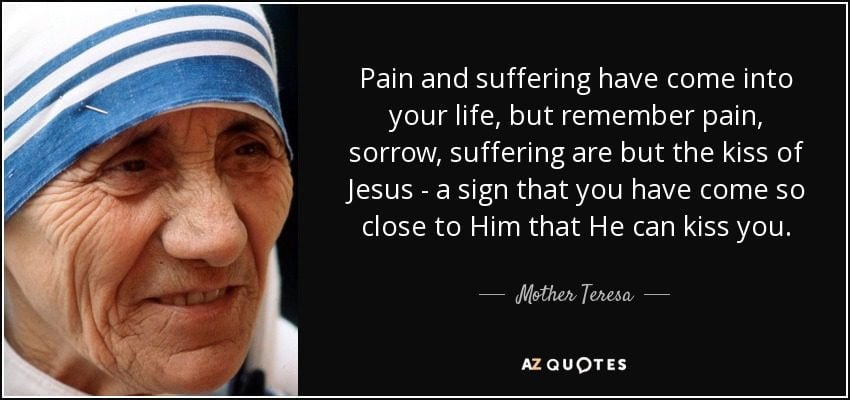
Kirsten Ryken, a writer for the Fundamentalist website The Gospel Coalition, recently wrote a post titled, Why I Thank God for Chronic Pain. Ryken’s article was part personal story and part justification for God allowing her to painfully suffer. Ryken concluded her post with this:
With the eye of faith, I saw Christ on the cross. God, in a human body, taking on physical pain far greater than my own. Thorns in his head, blood dripping down his face, nails in his hands and feet, love in his face. I felt his pain in my own body, the fire in my spine intensifying as I looked at him. But I also felt him holding me like a child.
I knew in my heart in that moment that nothing can separate me from the love of God in Christ Jesus (Rom. 8:39). I was completely overwhelmed with the knowledge that my God not only knows what’s wrong with my body even when no human doctor does, he also knows my physical pain more intimately than anyone else ever could. The loneliness of suffering and the frustration of not having answers were taken away in an instant. I felt a physical burden lifted from my body and my heart.
Until that moment, I had never understood the relevance of Christ’s death on the cross to the details of my daily life, my pains and my joys. It was only in the light of the cross that I could make sense of my own suffering. This reminder is the positive result of my pain. In moments when I feel overwhelmed, I remember Calvary. I thank God for the precious gift of my salvation, because on some (very small!) level I have begun to understand the cost of my salvation.
Chronic pain is a constant reminder that my life is not my own; it has been bought with a price.
The narrative Ryken spins is one often heard when Evangelicals try to explain pain and suffering: my suffering is next to nothing compared to the pain and agony Jesus suffered on the cross. In the minds of Christians such as Ryken, there’s no human suffering that can be compared to what Jesus faced on Calvary. This worn-out, tiresome trope gets repeated over and again by Evangelicals who never THINK about what they are actually saying. Jesus is the bad-ass suffering servant, Evangelicals would have us believe, but in fact, Jesus’ suffering was minuscule compared to what countless people face every day.
Yes, Jesus was beaten and his beard was plucked from his face. Yes, he was nailed to a Roman cross and suffered great indignity (that is assuming the gospel narratives are true). But how long did Jesus actually suffer? Days? Weeks? Months? Years? Nope. How about less than a day? Then he died, descended to hell, and hung out with its inhabitants, and then he resurrected from the dead good as new save for the nail prints in his hands and feet. Pray tell, based on what the inspired, inerrant, infallible Word of God says about Jesus’ suffering, how was his pain in any way worse than that which any human has ever experienced? By all means, compare Christ’s suffering to what children face when having radiation and chemotherapy treatments to eradicate cancer from their bodies. Go ahead, compare his suffering to that of people in burn units with third-degree burns over most of their bodies. Jesus may have faced intense levels of pain for a short amount of time, but how does his suffering compare to the pain of people who suffer with debilitating, chronic illnesses for years?
Jesus knew that his time of suffering would be short and sweet, and then he would die. Imagine a body wracked with pain day in and day out, years on end, with no relief in sight. I suspect such people might be willing to suffer what Jesus did if they knew afterward their bodies would be free from pain. I know I would. I would trade places in a heartbeat with the “suffering” Son of God if it meant come Sunday morning my body was no longer wracked with pain. And I suspect I am not alone in my blasphemy.
I don’t think for a moment that my short post will change Christian thinking on this subject. Ryken desperately needs a suffering Jesus to make sense of her own pain. Without Jesus, she is left with what? Shit happens? And to that, I say “yes.” None of us is guaranteed a pain-free life. Genetics, environmental factors, personal choices, and yet-unknown factors go into what diseases we contract and what pain we suffer. The late Christopher Hitchens was right when he said in his book Mortality,” To the dumb question ‘Why me?’ the cosmos barely bothers to return the reply: Why not?” Why me, indeed.
Christians invoke the suffering Jesus because it covers up the fact they suffer just like the unwashed, uncircumcised Philistines of the world, and that their God, much like the cosmos, yawns with indifference. Jesus, then, becomes the hospice nurse who holds their hands as they face cruelties, indignities, and sufferings beyond imagination. Jesus has promised Christians that he will never leave or forsake them, and he will never allow them to suffer more than they are able. Thus, whatever pain and suffering comes their way, God means it for their good, either to chastise them or teach them a lesson. If Christians will but endure what comes their way, words in an ancient religious text promise that they will be given pain-free bodies after death. Better to think this, many Evangelicals say, than to believe we live in a cold, heartless universe. Why, such a belief leads to despair! Christians say. To that, I reply, maybe for you it does, but it doesn’t have to.
I find comfort in the fact that shit happens, and chronic illness and intractable pain afflict rich and poor, young and old, religious or not. I know that I am not special and that countless other people are going through pain and suffering as bad as mine and worse. I am not owed a pain-free existence. I have been given life — just one — and it is incumbent upon me to live life to its fullest. I embrace my suffering, not looking to a mythical deity for inspiration or help. I find comfort in the fact that my wife, children, and friends deeply care about me and do what they can to lessen my pain. And I try to do the same when dealing with others who are facing troubles and trials, physical or not. Is there any more any of us can do for each other? A kind word, a thoughtful action, a tender embrace, these are enough. It is humanism, with its goal of lessening suffering, that shines the brightest. Christianity says endure, promising a divine payoff in the sweet by-and-by. Humanism says we only have one life, let’s do all we can to lessen pain and suffering. Christianity says pain and suffering have a higher purpose, be it correction or testing. Humanism says alleviating pain allows people to live happy lives, and in this cold universe of ours, that’s the best any of us can expect. Despite my pain, or perhaps because of it, I choose Humanism.
Bruce Gerencser, 68, lives in rural Northwest Ohio with his wife of 47 years. He and his wife have six grown children and sixteen grandchildren. Bruce pastored Evangelical churches for twenty-five years in Ohio, Texas, and Michigan. Bruce left the ministry in 2005, and in 2008 he left Christianity. Bruce is now a humanist and an atheist.
Your comments are welcome and appreciated. All first-time comments are moderated. Please read the commenting rules before commenting.
You can email Bruce via the Contact Form.


